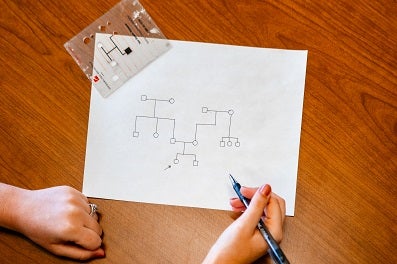Curriculum:

The curriculum is designed specifically for the genetic counseling discipline and delivered as a cohesive learning experience for online students. Program Curriculum consists of 56 credit hours (41 didactic credits, 15 fieldwork credits, 4 scholarly project credits) taught by faculty from several Boise State departments as well as numerous guest lecturer content experts from across the profession.
Students gain core knowledge of established and evolving medical and clinical genetics while also applying counseling skills in human genetics to patient care. Content includes principles of human genetics, clinical genetics (cancer, adult, pediatric, metabolic, neurology, cardiology, pharmacogenetics etc.), public health, bioethics, counseling techniques, facilitating decision-making, risk assessment and calculations, research methodology, epidemiology, statistics, wellness, and self-care.
This curriculum supports the development of ABGC practice-based competencies in genetic counseling such that graduates of the program will not only be prepared to pass the ABGC Certification exam but also have developed a skill set that will make them desirable additions to a healthcare team.
Fieldwork:
Clinical rotations take place during Fieldwork II-IV courses and will be face to face experiences beginning in the third semester (summer) of the second year. Rotation schedules will vary for each student with rotations taking place primarily within the Core Clinical Network, and fieldwork schedules will be discussed and customized individually with each matriculating student. If a clinical rotation site is not available near the student’s residence, temporary relocation may be required.
Some flexibility has been built into Fieldwork courses for personalizing the clinical experience that best fits the student needs. Students will be responsible for their own transportation, travel and related expenses which is not included in tuition or program fees. Students will be expected to obtain a minimum of 50 core cases that meet ACGC requirements. Additional cases will come from a wide variety of clinical settings and service delivery models. Students will be able to demonstrate mastery of skills in alignment with the ABGC practice-based competencies for genetic counselors. More information is available on the Fieldwork page.
Capstone Project:
Students will work in conjunction with an Advisory Committee to identify a Capstone Project which will be presented at the end of the second year. Capstone projects should be individualized to the student’s personal and professional interests, and may include a business proposal, educational project, a multimedia project, research project, or other pre-approved endeavor. The Capstone Project must demonstrate the student’s ability to successfully complete academic research and/or project management, and should also demonstrate the student’s mastery of the ABGC practice-based competencies for genetic counselors.
Supplemental Activities:
Supplemental activities are required in order to develop the student’s inter-professional education and professional skills. Activities that are included in this category are: journal club, case presentation conferences, and peer supervision conferences. Journal Club occurs bimonthly with involvement from community genetic counselors and students/faculty from other College of Health Science departments. Case Conference occurs with students from the online Master of Science in Respiratory Care during the first session of the summer semester. Peer supervision conferences are held in the second year during Fieldwork.
Degree Completion Requirements:
- Complete all required courses maintaining an overall 3.0 GPA
- Participate in all supplemental activities as required
- Complete a Capstone Project, including presentation of the project
- Submit an online Professional Portfolio of activities related to professional development
- Complete a minimum of 50 ABGC approved core cases
- Pass the comprehensive written examination